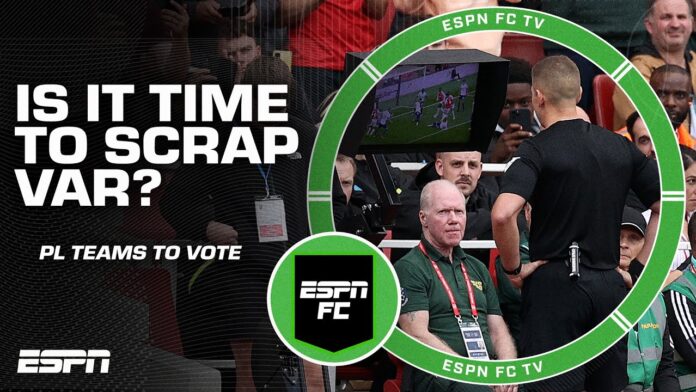Debate over VAR’s future in the Premier League intensifies as clubs prepare for a pivotal vote on its usage next season
The Premier League faces a crucial vote to determine the future of video assistant referees (VAR) for the upcoming season. The vote, scheduled for 6 June, was initiated following a formal resolution submitted by Wolverhampton Wanderers (Wolves) on Wednesday. All 20 member clubs will participate in this vote at their annual general meeting.
Wolves’ resolution comes amid a backdrop of widespread debate, scrutiny, complaints, and apologies surrounding VAR since its introduction in the 2019-20 season. Despite the ongoing controversies, the Premier League remains supportive of VAR. In April, member clubs voted to implement semi-automated offsides starting from the 2024-25 season. However, BBC Sport reports that Liverpool, along with three other unnamed clubs, oppose scrapping VAR.
The league argues that VAR has significantly improved the accuracy of decisions, claiming an increase from 82% correct decisions before VAR to 96% this season. This assertion raises the stakes for the upcoming vote, as clubs must consider the balance between technological assistance and the traditional flow of the game.
The Voting Process and Stakes
Member clubs will vote on whether to eliminate VAR entirely, essentially reverting to pre-2019 officiating methods. This change would also impact the planned introduction of semi-automated offsides, a recent decision aimed at enhancing decision-making accuracy.
To pass this resolution, 14 out of 20 clubs must vote in favour, as per Premier League rules requiring a two-thirds majority for rule changes. Currently, Wolves stand alone in their public support for scrapping VAR. Nottingham Forest, though silent, might align with Wolves given their recent criticisms of VAR. Newly promoted Leicester City and Ipswich Town have yet to disclose their positions, having not used VAR in the Championship.
Club Positions on VAR
Liverpool remains a vocal supporter of VAR, despite past calls for greater transparency following a controversial disallowed goal against Tottenham. Three additional clubs have expressed their preference to retain VAR, emphasizing the need for improvements rather than elimination. Several other clubs have refrained from public comments, adding an element of uncertainty to the vote.
Clubs like Manchester City, Arsenal, Liverpool, and Aston Villa, who will compete in the Champions League next season, may find scrapping VAR challenging due to its usage in European competitions. The same applies to clubs vying for spots in the Europa League and Europa Conference League, such as Manchester United, Newcastle United, Tottenham, and Chelsea.
Likelihood of the Vote Passing
The possibility of the vote passing appears slim. Wolves must rally significant support within the next three weeks, a formidable task given the need for 14 affirmative votes. The Premier League itself opposes scrapping VAR, highlighting the technological improvements and increased correct decision rates since its implementation.
Furthermore, removing VAR would isolate the Premier League, as most elite leagues globally utilize the technology. Only Sweden among UEFA’s top 30 leagues has rejected VAR, making the Premier League an outlier if the vote passes.
Potential Outcomes and Next Steps
Dialogue among clubs is likely to precede the vote, as members seek to gauge collective sentiments. Dale Johnson, a VAR expert from ESPN, suggests that the vote could spark further discussions on improving the system rather than scrapping it. Johnson predicts that VAR will remain, but with a push for enhancements in its deployment.
Recent statements from clubs like Liverpool, Arsenal, Wolves, and Forest underscore the growing discontent with current refereeing standards and VAR usage. In February, Premier League chief football officer Tony Scholes acknowledged the need for quicker decisions and better in-stadium experiences for fans, suggesting future trials of video and audio feeds of decisions.
Fan Reactions
The potential scrapping of VAR has sparked significant debate among fans. A recent BBC Sport poll revealed a strong preference for removing VAR, with 2,173 votes in favour compared to 517 votes for keeping it. This four-to-one ratio reflects the frustration and desire for change among the fanbase.
As the vote approaches, the Premier League faces a pivotal moment in deciding the future of officiating in English football. The outcome will shape not only the gameplay experience but also the league’s alignment with international standards.
Analysis
Political Perspective
Politically, the VAR debate underscores the complexities of governance within the Premier League. Clubs must balance technological advancements with traditional values, navigating pressures from various stakeholders, including fans, players, and governing bodies.
Sociological Perspective
Sociologically, VAR has altered the dynamics of football fandom and viewership. Fans’ in-stadium experiences have shifted, often leading to frustration over delayed decisions and perceived inconsistencies. The vote reflects broader societal trends toward technological scepticism and the demand for transparency.
Economic Perspective
Economically, the decision impacts broadcasting and commercial agreements. VAR’s presence ensures uniformity with other major leagues, crucial for maintaining global viewership and sponsorship deals. Removing VAR could create disparities in match coverage and marketing strategies.
Local Perspective
Locally, clubs face diverse fan reactions. Some local supporters may prefer the traditional, uninterrupted flow of the game, while others may appreciate the accuracy and fairness VAR aims to provide. Clubs must weigh these local sentiments when casting their votes.
Theoretical Perspective
From a theoretical standpoint, the VAR debate involves considerations of fairness and justice in sports. The technology aims to reduce human error, aligning with principles of equity. However, its implementation has sparked discussions on the balance between human judgment and technological intervention.
The upcoming vote will serve as a critical juncture in the Premier League’s evolution, with implications for the sport’s future at both domestic and international levels.
